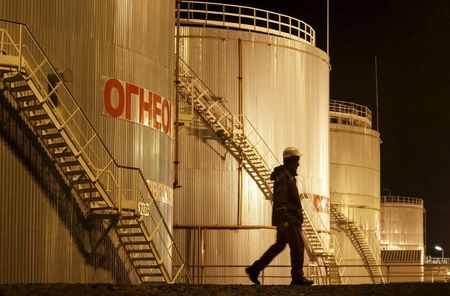
Investing.com– Oil prices ended the week in the red despite settling higher Friday, as Federal Reserve chairman Jerome Powell’s signal that rate cuts were coming boosted sentiment on risk assets.
At 14:30 ET (18:30 GMT), Brent oil futures rose 2.3% to $79.02 a barrel, while West Texas Intermediate crude futures gained 2.5% to settle at $74.83 a barrel.
Powell tees up rate cuts ahead
“The time has come for policy to adjust,” Powell said on Friday. The Fed chair also hinted that larger rate cuts could be delivered should the economic slow at a faster pace than expected.
The confirmation somewhat that rate cuts are ahead partly eased concerns about a weaker U.S. economy weighing on oil demand.
Still, the demand outlook remains uncertain as China, one of the largest consumers of oil globally, continues to face slowing economic growth.
Supply glut fears
While U.S. demand appeared strong in the near-term, as reflected in government data showing an outsized drawdown in inventories earlier this week, traders feared that worsening economic conditions could stymie demand in the coming months.
Fears of an oil supply glut were also in play, after U.S. oil production rose to a record high of over 13 million barrels earlier in August.
The number of oil drilling rigs, a gauge of future production, remained flat at 483 from the prior week, Baker Hughes reported Friday.
The Organization of Petroleum Exporting Countries and allies, a group known as OPEC+, has plans to raise output later this year.
The cartel had recently trimmed its outlook for global oil demand, citing concerns over weak demand in top oil importer China.
Israel-Hamas ceasefire in focus
U.S. officials said that a ceasefire between Israel and Hamas was close, although media reports said that Israel and Hamas were less confident over an agreement.
Israel had earlier this week reportedly agreed to a bridging agreement proposed by the U.S.
But Hamas had criticized the agreement for allegedly favoring Israel.
The Israel-Hamas conflict has kept traders attaching some risk premium to oil prices, on the prospect of supply disruptions caused by a spillover in the conflict. But conflict has so far had a limited impact on actual crude supplies.
(Peter Nurse, Ambar Warrick contributed to this article.)
This post is originally published on INVESTING.



